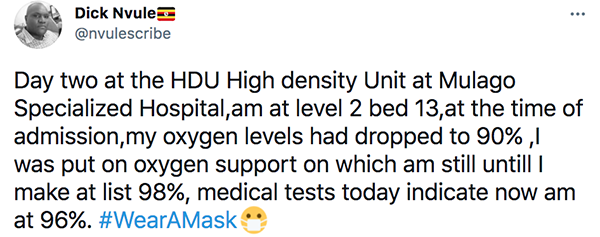Uganda’s Capital, Kampala has for last 21 days seen a steady increase in coronavirus hospitalizations.
Government and private health facilities in Kampala are full to capacity, health frontline workers are overstretched in administering treatment, cases are surging and over 150 deaths have been registered in the last one week, according to data from Ministry of Health.
Media reports suggested that majority of the deaths registered in the country occurred at Mulago Referral Hospital due to oxygen shortage.
A local daily alleged that 30 patients perished at Mulago over lack of oxygen.
The hospital administration together with Ministry of Health refuted the claims saying 17 people unfortunately died last week on Tuesday and Monday.
They explained that the deaths resulted from severity of disease resulting into multiple organ failure.
“A total number of 7 were from intensive care unit and the rest were from High Dependency Unit. It is important for the public to note that patients admitted to Mulago ICU and HDU are referrals from other hospitals and are very sick with multi organ failure requiring multiple medical interventions including oxygen therapy.” a report from Mulago indicated.
Against that backdrop, last friday President Yoweri Museveni in consultations with experts imposed a new lockdown with tougher measures for 42 days
At the same time, some people are experiencing pandemic fatigue and are iring of following safety guidelines.
RAY OF HOPE
However, there is hope of survival as told by a Covid-19 patient who spent 6 days in Intensive Care Unit (ICU) at Mulago fighting for his life
Dick Nvule, a senior journalists working with Simba Radio based in Bukoto- Kampala thought he wouldn’t survive the virus.
He explains that, at the beginning of this month, he felt sick and he thought he had malaria.
Medical tests indicated he had malaria and bacterial infection which he treated for five days but there was no improvement, instead his health deteriorated.
On the 6th day (June 6), Mr Nvule was gasping for breath.
“One morning I was struggling to breathe and my wife rushed me to Mulago where I was admitted and put on oxygen therapy,” he narrates.

At Mulago, the doctors advised Nvule that if he wants to survive he must listen to the rules.
“They told me there were two rules, keeping your oxygen on, eating warm things and drinking warm water, and of course taking your medication.”
Nvule was consuming 5 litres of oxygen daily at of his admission.
“I started with 5 liters until it dropped to 1 liter that is when I was removed and started breathing on myself,” he said.
He explains that if a patient is not strong, he/ she may give up due to paranoia, seeing people struggle and other die while in the same ward.
“It is terrible, especially seeing patients struggling and fighting for their lives.”
He adds that the healing process, has its own challenges, “I used to get panic attacks at night, those have since gone. But also I would lack sleep at night. When you are on that bed alone. It is a nightmare.”
Mr Nvule was admitted on June 6, and discharged on the 12th.
His describes Mulago doctors as “too friendly” and “very attentive.”
“They give you time and they make sure you ask them all the questions,” he said.
At a time of his admission, Mr Nvule said he never lacked oxygen.
“There was never scarcity of oxygen in the wards. May be at the reception before admission, I saw people that really needed it but could not quickly get, but after sometime they would get,” he said.
Mr Nvule is now at home recuperating and intends to make the final tests before he resumes his work at Simba Radio.





